Tokyo's Coolest Farmers Market: A Sustainable Community at UN University
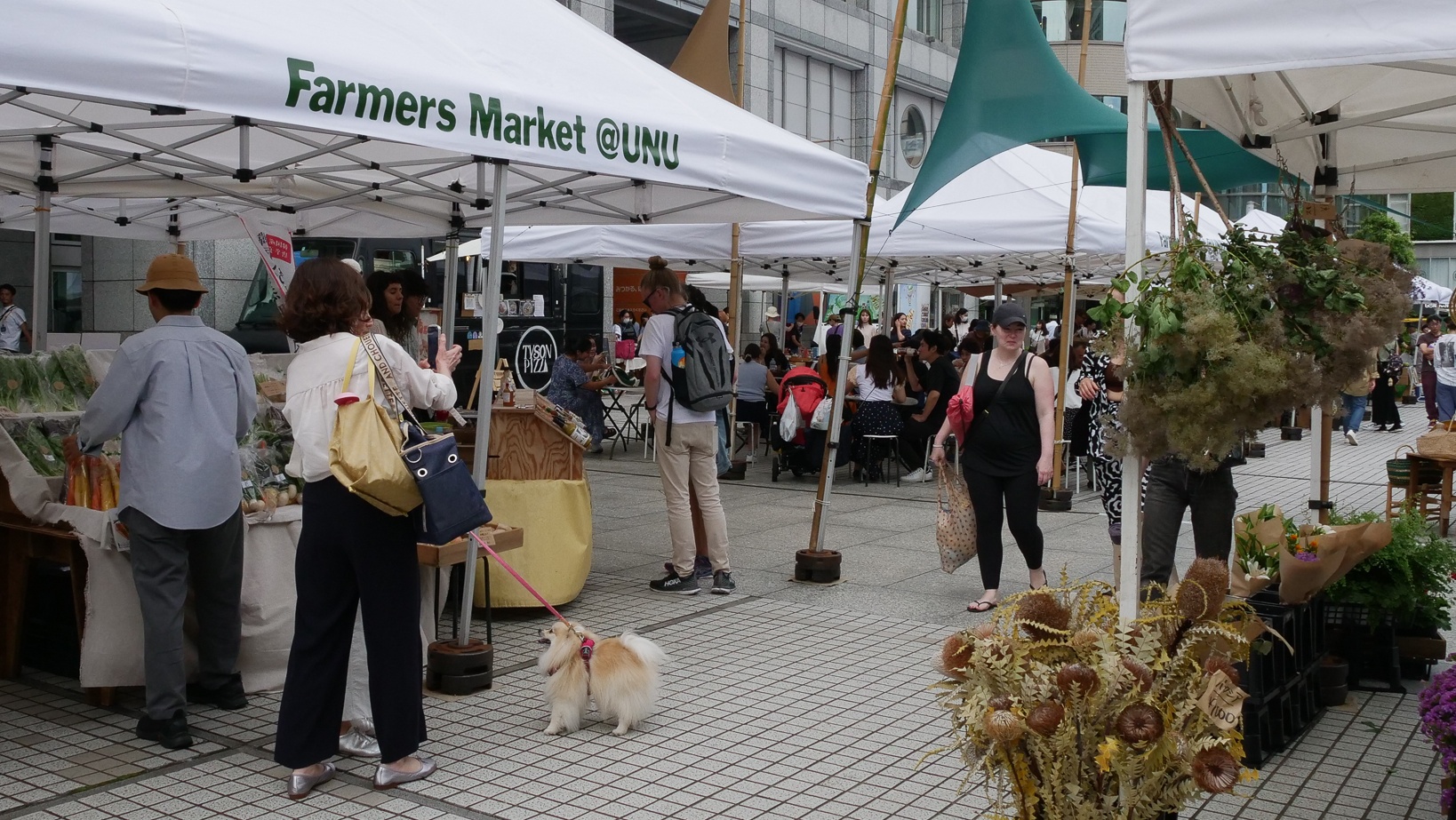
Every weekend, the plaza outside Tokyo's United Nations University (UNU) in Omotesando fills with rows of vendors and crowds of customers. The city's largest farmers market is a hub for regional produce, tasty street food . . . and ideas for building a better future. Phoebe Amoroso reports on the latest trends.
By Phoebe AmorosoOn a snowy day on the Sugadaira Plateau, Nagano Prefecture, a small, well-clad group began shoveling snow in a field of vegetables. They were on a rescue mission organized by a farmers’ market in central Tokyo, and were digging for green gold—hakusai, or Chinese cabbage—that was set to remain uneaten if unharvested.
A couple of weeks later at Tokyo's Farmers Market at UNU, the hakusai had been transformed. Street food vendor Deeney’s Tokyo, renowned for its haggis toasties straight from a London market, was serving up a gloriously gluttonous “Squash Spice,” crispy, buttery slices of toast stuffed with kabocha squash, oozing with cheese and packing a fiery punch from kimchi made from that very nearly lost hakusai.
The team was sharing its kimchi recipe; and they launched a one-off workshop to teach eager participants how to make their own, using hakusai from fellow market vendor Bugrass Farmers.
“Although it was the first ever workshop at the market, it was so popular. People filled the spots so quickly that we had to take down the registration page almost immediately,” says Yoko Hasegawa, co-owner of Deeney’s Tokyo. “We had such a positive response; the workshop was really well received. I'd love to hold a similar one in London.”
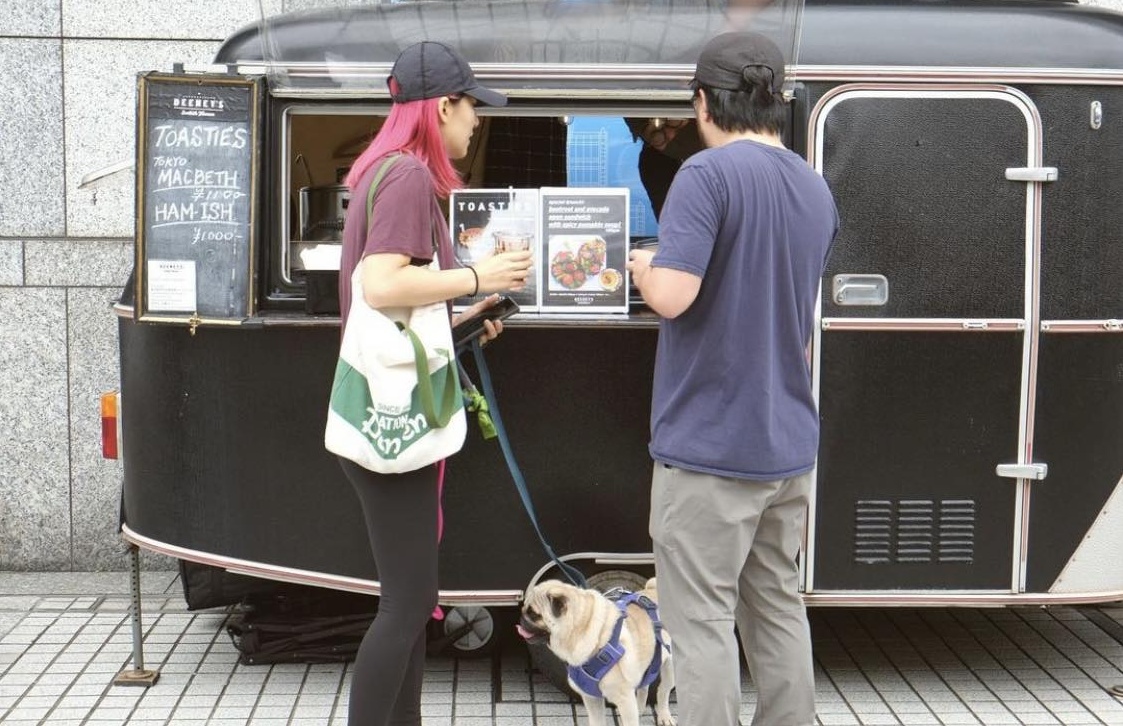
Deeney's Tokyo serves up toasties to hungry shoppers every weekend
The collaboration between the toastie truck and fellow market vendors highlights how the Farmers Market at UNU has come to embody a multifaceted sustainability on an environmental and social level. Beyond a space to sell fruit and vegetables, it represents a community where creativity and connections are born.
The market has been a weekly fixture outside the United Nations University in central Tokyo for more than a decade, but it had a faltering start. The initiative was first launched back in 2009, when a group of young Tokyo residents took advantage of a grant from the Ministry of Agriculture, Forestry and Fisheries to help establish farmers markets across the country. At first they struggled to make the project viable.
“When I first experienced a shortage of goods in supermarkets and convenience stores, I realized that our food system isn’t something to be taken for granted."
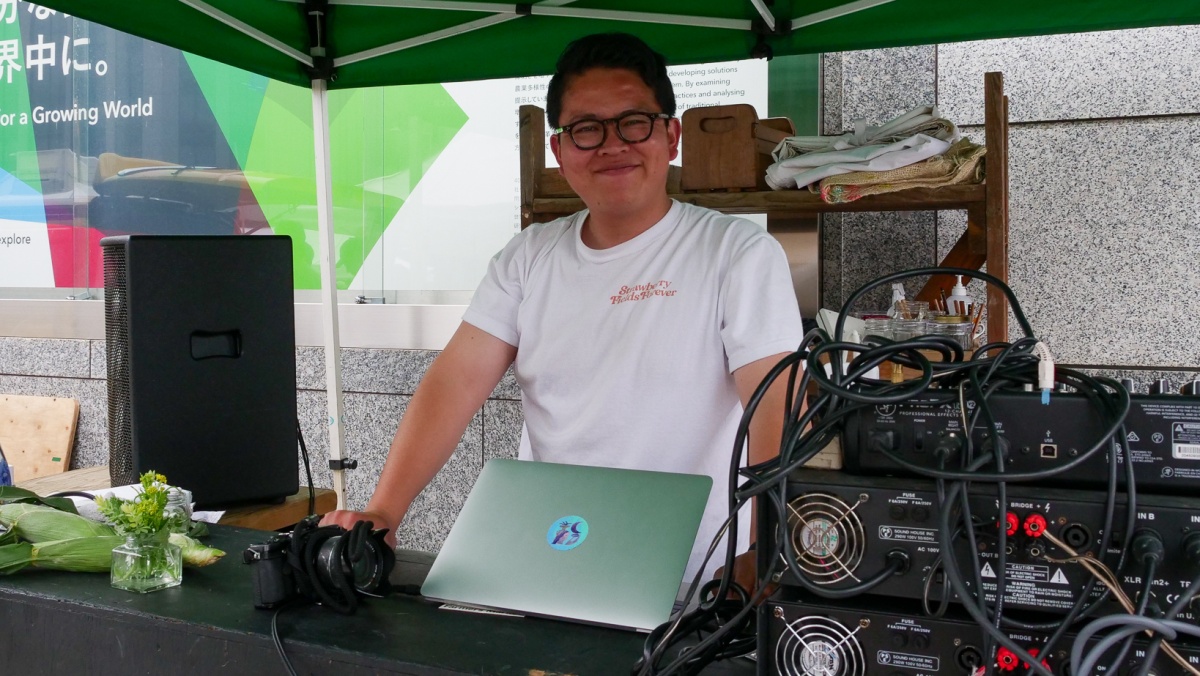
“We are united by the idea that we’re making this market together.” Wataru Tanaka, Farmers Market @ UNU Manager
“I heard from the team that there were so many financial challenges,” says Wataru Tanaka, Farmers Market @ UNU Manager, who joined the market shortly after the 2011 Tohoku tsunami and earthquake. It was to become a pivotal moment.
“When the disaster struck, they were really debating whether to continue. But people came together to form a community and that sparked fresh recognition of the importance of this kind of community space.”
For Tanaka, the ramifications of the disaster were something of a wake-up call about how precarious food supply systems can be, and motivated him to get more involved.
“When I first experienced a shortage of goods in supermarkets and convenience stores, I realized that our food system isn’t something to be taken for granted,” he says.
The market adheres to the concept of “we are what we eat”
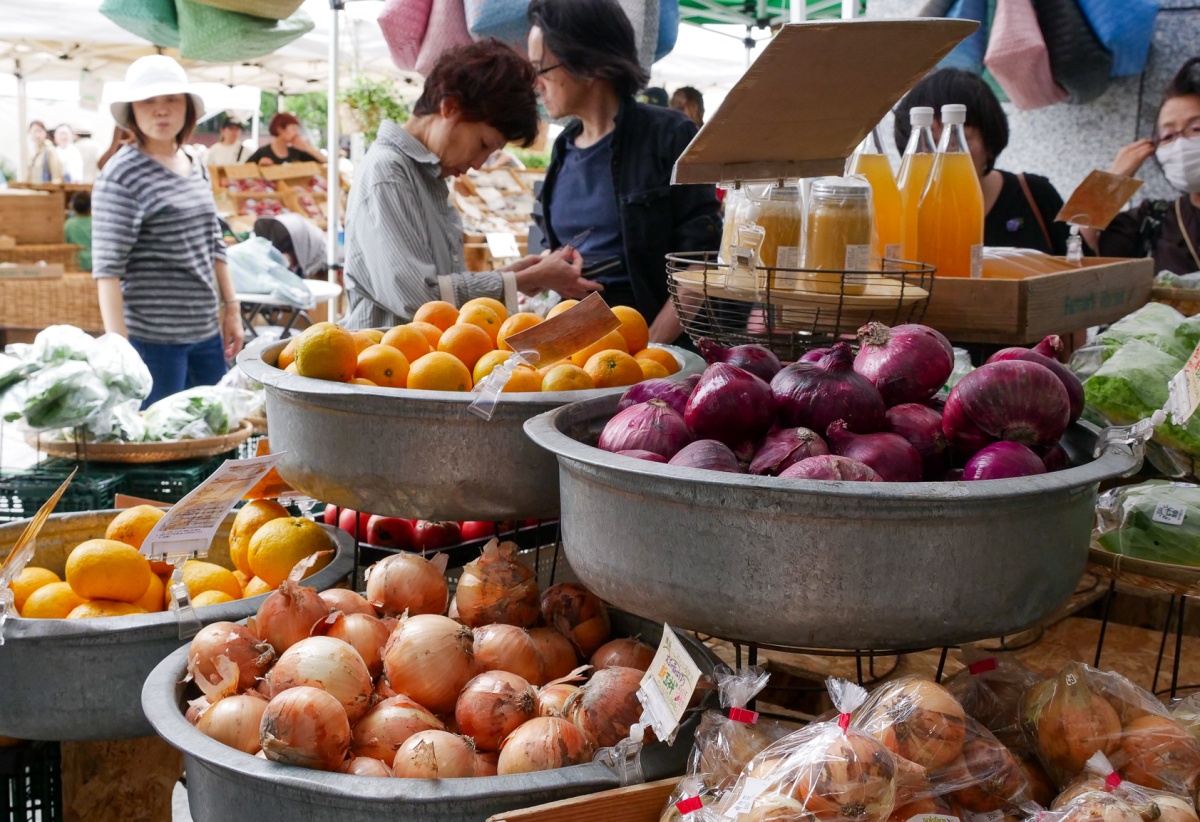
Fruit and vegetables grown without chemical fertilisers
Today, the market hosts around 70 stalls every Saturday and every Sunday, with traders rotating between the days and weeks. There are fruit and vegetables from all over Japan—apples from Nagano, tea from Shizuoka, rice from Hokkaido—with many producers focused on organic or natural cultivation. There are examples of artisanship, like Kikusumi which sells hand-crafted knives, or Bonsai Rien, offering stylish bonsai to modern customers.
Other traders have a more explicit social mission. Sanchai Peanut Butter established a factory in Nepal to provide employment for local women, and MORIUMIUS At Home produces natural wine from Tohoku grapes, with a goal of eventually using grapes grown on land impacted by the 2011 tsunami.
The market adheres to the concept of “we are what we eat,” and places value on being able to directly engage with producers, understanding the methods and systems that have enabled food to arrive at our plates, allowing people to make more conscious choices as consumers.
The key, Tanaka says, is that the team works hard to hold it every week without fail, rain or shine, providing a reliable event that attracts regular visitors. The only time the market took a break was during the coronavirus pandemic; the team rallied to set up a temporary online shop for sellers’ produce, an initiative they’re considering restarting in the future.
“I want people to understand that protecting the natural environment is the basis for the continuance of human life."
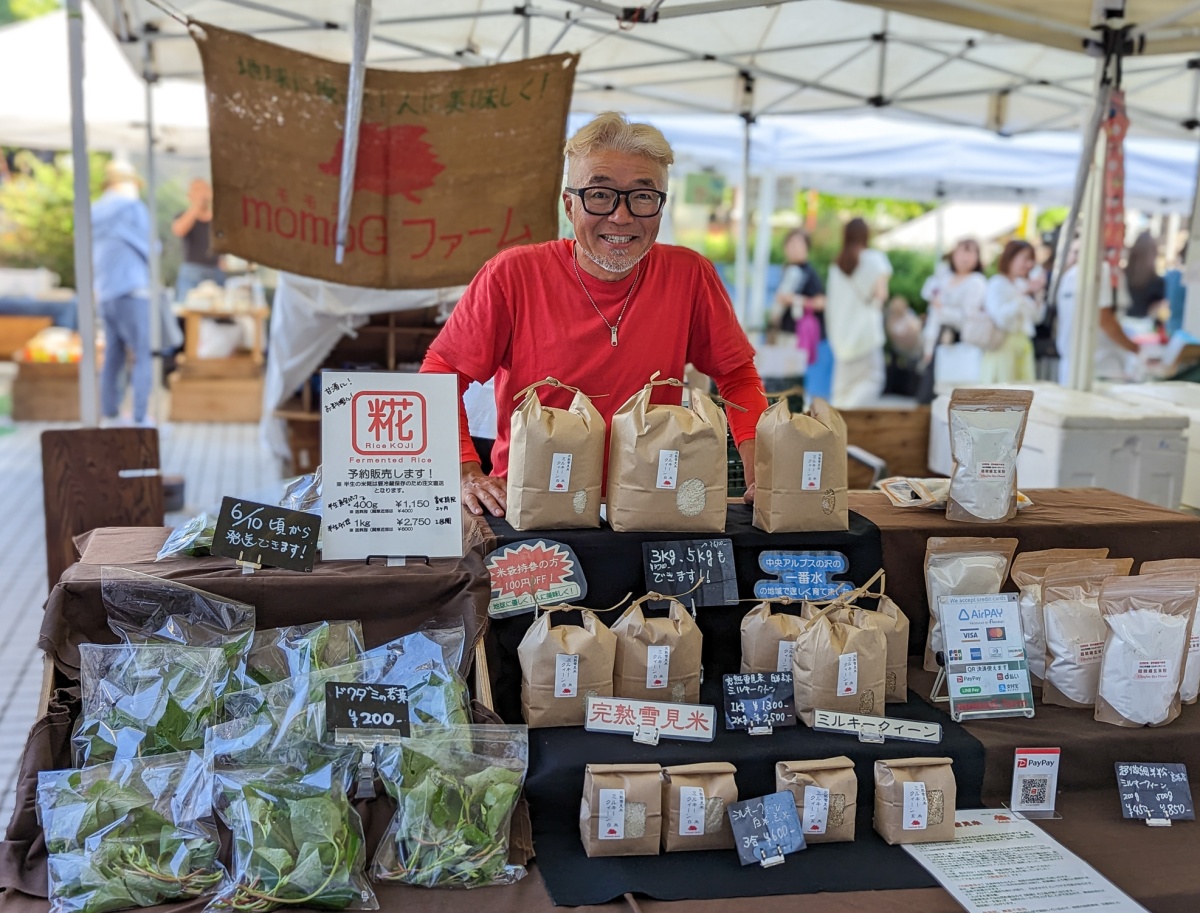
Tomonori Nakayama wants more people to understand the importance of natural farming methods
Tomonori Nakayama runs Momo G Farm in Nagano Prefecture and has been selling his organic vegetables and rice at the market for eight years.
He initially started out as a mechanic, but a love of nature and hiking drew him into organic farming. He grows everything without pesticides and even shuns natural fertilizer. He says his deep understanding of the natural cycle through which nutrients and microbes enter the soil allows him to farm both productively and harmoniously without artificial interventions.
Nakayama greatly values the opportunity he gets to engage with customers face-to-face at the market.
“Because it's not the normal agricultural method, it's easier to explain what's special, what’s important when talking directly to customers,” he says. “I want people to choose my products through understanding the production method.”
Nakayama says awareness of sustainability has increased among his buyers over the past three to four years, but he still feels that there is a long way to go nationwide. His customers are often more concerned about health impacts of non-organic produce as opposed to impact on ecosystems.
“I want people to understand that protecting the natural environment is the basis for the continuance of human life,” he says. “We have to protect that above all.”
He hopes to raise environmental awareness through continuing to engage with people on a weekly basis. Of course, he says, the great taste of his vegetables helps too.
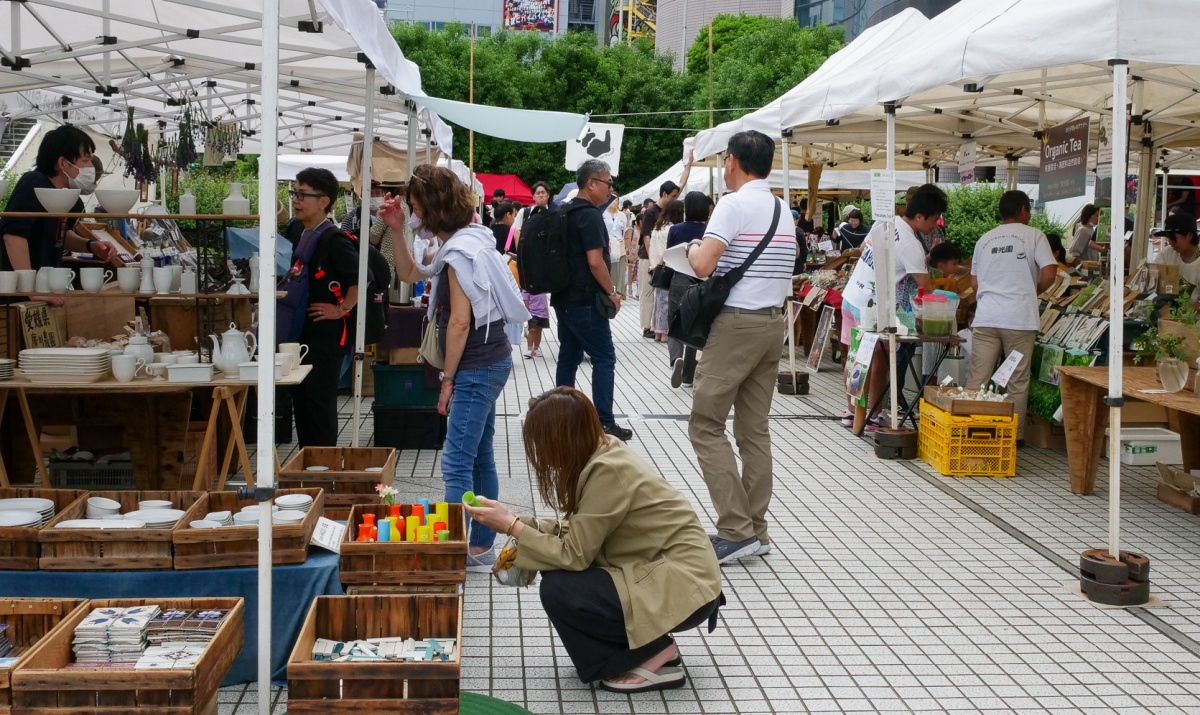
Weekend shoppers
The team at Farmers Market at UNU note their role is modest, but they’re glad to provide a space that is helping to promote awareness and discussion of sustainable practices and lifestyles. Deeney’s Tokyo are already thinking about future workshops, and there are hopes that such events will inspire further cooperation between the traders.
“We were really happy to have facilitated the collaboration,” says Tanaka. “It reflects one of the original meaning of this market. We hope these kinds of initiatives will increase going forwards.”
The market has grown to become a weekly community, he says, because it relies on a team effort by people with a shared vision.
“We are united by the idea that we’re making this market together.”
Tokyo's Farmers Market at UNU
United Nations University, 5-53-70 Jingumae, Shibuya
Saturdays & Sundays, 10am - 4pm
farmersmarkets.jp



